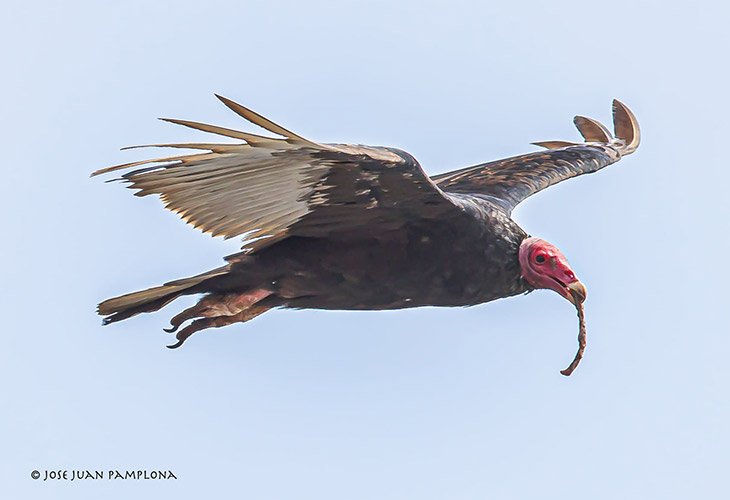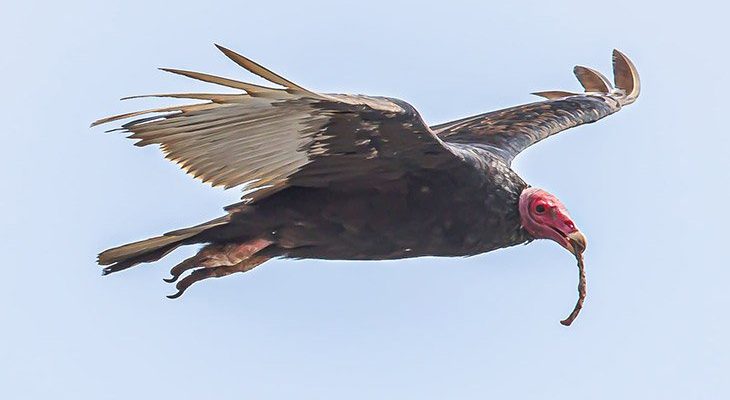
When we think about birds of prey, we often envision hawks or eagles, which actively hunt for their food. Turkey vultures, on the other hand, have a different approach to dining. They primarily eat carrion, which sounds a bit grim but is essential for keeping nature clean. You might be wondering, “How do these birds find their meals, and what exactly do they eat?” Let’s break it down.
Understanding the Turkey Vulture’s Diet
Turkey vultures are opportunistic feeders, meaning they eat whatever is available, focusing on dead animals. Their diet mainly consists of:
- Rabbits
- Raccoons
- Deer
- Small rodents
- Roadkill
Here’s the thing: turkey vultures are highly specialized for this role. They have excellent senses, especially smell, which is quite rare in the bird world. While many birds rely on sight, these vultures can detect the gases produced by decaying animals from miles away. Think of them as nature’s detectives, using their keen sense of smell to track down meals.
You might find it surprising that turkey vultures can even eat food that’s been dead for several days. Their digestive systems are equipped with powerful acids that break down harmful bacteria found in rotting flesh. This allows them to feast without getting sick, making them true survivors in their environment.
Hunting Strategies: How Do They Find Food?
Turkey vultures don’t hunt in the traditional sense. Instead, they soar high in the sky, often reaching heights of up to 15,000 feet, scanning the ground below for food. Their large wings help them glide effortlessly, conserving energy as they search for carrion.
One intriguing aspect of their hunting strategy is their ability to work as a team. Often, you’ll see them flying in groups, which helps them spot food more efficiently. If one vulture finds a meal, it won’t be long before others join in for a feast. This cooperative behavior is consistent with their evolutionary role in the ecosystem.
When they spot a carcass, turkey vultures use their keen eyesight to assess if it’s safe to land. Unlike aggressive hunters, they prefer to wait for their prey to be dead, avoiding confrontation with living animals. Their hunting style is more about patience and endurance than speed or aggression.
Physical Adaptations for Scavenging
Turkey vultures have several physical traits that help them in their scavenging lifestyle. For starters, their **bald heads** are a unique adaptation. This may seem unappealing, but it serves a purpose. A feather-covered head would trap bacteria when the vultures are pecking at carcasses, but a bald head can be cleaned easily.
Additionally, their **strong beaks** are perfectly suited for tearing into tough hide and flesh. When they find a meal, they can use their beaks to access the nutrients within a carcass that other birds might struggle to reach.
Their **aerodynamic bodies** and broad wings allow them to soar with the best of them. This not only helps them cover vast distances while searching for food but also lets them take advantage of thermal updrafts to conserve energy during long flights.
Environmental Role of Turkey Vultures
Turkey vultures play a crucial role in the ecosystem as scavengers. By consuming dead animals, they help prevent the spread of disease. Without these birds, decomposing animals would linger in the environment longer, leading to potential health risks for other wildlife and even humans.
Moreover, their feeding habits promote nutrient recycling. As they consume carcasses, they break down organic matter, returning vital nutrients to the soil. This process helps maintain a balanced ecosystem, supporting plant growth and the health of other animal species.
In many cultures, turkey vultures are seen as symbols of change and renewal. Their ability to thrive on decay reminds us that life continues, even in death.
Common Misconceptions
Despite their essential role, turkey vultures are often misunderstood. Many people think they’re gross or dirty, but in truth, they’re vital to a healthy environment. It’s pretty fascinating when you consider that they help clean up nature’s mess!
Another common myth is that turkey vultures are aggressive, but they’re quite the opposite. They rarely attack living animals, preferring to wait for something to be dead. They may defecate or regurgitate when threatened, which is a defense mechanism, not an act of aggression.
Recognizing these misconceptions can help us appreciate the turkey vulture’s unique adaptations and ecological importance. So, the next time you see one soaring above, remember: they’re not just scavengers; they’re environmental heroes.
Turkey vultures are remarkable birds that serve an important purpose in our ecosystem. Their scavenging diet and unique hunting strategies help keep our environment healthy and clean. By understanding these birds better, we can appreciate their role and maybe even change how we view them.
Whether you enjoy watching them soar in the sky or are curious about their habits, turkey vultures deserve our respect. So, the next time you see one on the side of the road or overhead, consider the amazing adaptations and the essential function they serve in nature. After all, in the grand tapestry of life, every creature has its part to play.

